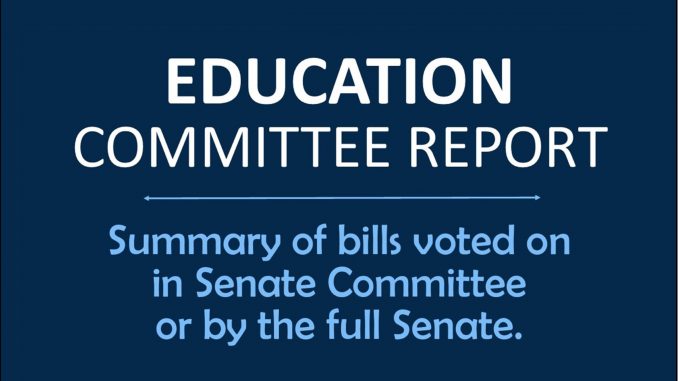
HF 472 – Teacher forgivable loan program modification
HF 563 – Student athlete concussion protocols
HF 564 – Flexibility in school funding
HF 565 – Establishing a school district flexibility account
HF 573 – Home rule authority for school districts
COMMITTEE ACTION
HF 472 clarifies the Legislature’s intent to prevent someone from receiving assistance from the Teach Iowa Scholar program and the Teacher Shortage Loan Forgiveness Program at the same time.
[3/29: 14-0 (Edler excused)]
HF 563 puts several requirements in statute for coaches, state high school athletic unions and schools in the name of student athlete protection. The bill:
- Requires coaches to go through CPR training to obtain or maintain their coaching authorization.
- Requires the athletic unions to establish return-to-school and return-to-play post-concussion protocols and distribute them to school districts.
- Requires schools to adopt the protocols, distribute concussion information to parents and obtain signatures from parents on the concussion information before students can participate.
- Requires that coaches or school administrators notify parents immediately or as soon as practical after a student shows signs or symptoms of a concussion during play.
[3/29: 14-0 (Edler excused)]
HF 564 provides some flexibility in school funding. Despite underfunding the PreK-12 school system for the last seven years, some are expressing concerns about carry forward ending balances in schools’ categorical funds. When new programs are created, certain guidelines are attached to the funding schools receive, dictating how they can spend the funds. This bill makes changes to a number of funds, including professional development funding, at-risk and dropout funding, preschool funding, and PPEL (Physical Plant and Equipment Levy) funding, by adding additional allowable expenses meant to help further the goals of the program. It also includes language to provide additional flexibility regarding rules and guidelines handed down from the Department of Education.
[3/29: 14-0 (Edler excused)]
HF 565 sets up a school district flexibility account. Because of the parameters around certain program funding, some school districts are unable to fully use their resources and end up accumulating unused funds year after year. There are more than 74 identified sources of funding in which school districts statewide have leftover funds totaling more than $146 million in FY15 (a $17.5 million increase over FY14). HF 565 creates a new “Flexibility Account” to collect some of these dollars to be used in a broader fashion, while keeping with the direction of the original source of the funds. This account would give districts more spending authority, help them access some of this unused funding, and use the money to provide more high-quality programming and a stronger educational environment overall.
An allocation from the Flexibility Account must be approved by the school board, and must be included in the budget certified by local budget law (chapter 24). Before approving an allocation, the school board must hold a public hearing, including proper public notice of the hearing of the proposed resolution, the original purpose of the funds, the proposed use of the funds, the amount of the proposed allocation, and the fiscal year in which the transfer occurred.
HF 565 requires the Department of Education to engage in a manner that gives deference to the decisions of a school district and minimize intrusion into their decision making. This would involve decisions when they are carrying out agency action or decisions related to categorical funding.
[3/29: 14-0 (Edler excused)]
HF 573 provides Home Rule authority to schools. Iowa’s current education system operates under Dillon’s Rule, which grants powers to school districts that are expressly allowed by statute. It tells school districts what they can do. Judge Forest Dillon, once a chief justice of the Iowa Supreme Court, authored this famous rule, which was quickly adopted by supreme courts in other states around the nation.
Under home rule, school districts could adopt policies, unless expressly forbidden by statute. Districts would be told what they cannot do. Home rule for counties was amended into the Iowa Constitution in 1978 under Article III, amendment 39. Changing the statute may not accomplish the intended goal, however, since there would be conflicting statutes.
The bill would create a new code section that would direct school boards to have home rule for certain programs. This code section would likely conflict with other code sections requiring school boards to perform certain duties or functions, and would more than likely have to be interpreted by the courts for implementation. The bill requires school districts to operate, control and supervise schools within their boundaries, and allows them to “exercise any implied power, not inconsistent with the laws and the administrative rules related to the operation, control and supervision of those public schools.” School boards do not have power to levy taxes unless expressly authorized by the Legislature.
[3/29: 12-2 (Quirmbach, Dvorsky “no”)]
